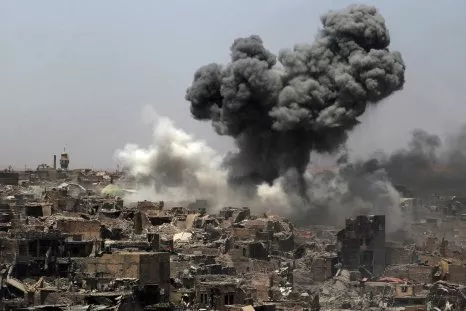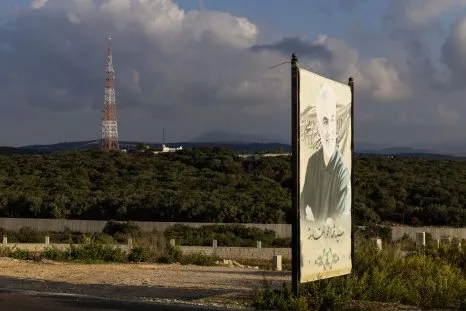US Says Iran-Backed Coalition Formed to Attack Its Troops in Iraq and Syria
The U.S. military has warned that a new coalition of Iran-backed militias has been behind a series of attacks against U.S. troops stationed in Iraq and Syria in the midst of an explosive war between Israel and the Palestinian Hamas movement.
Since October 17, the same day that the Israel Defense Forces (IDF) and Palestinian factions blamed one another for a deadly blast at the Al-Ahli Arab Baptist Hospital in the Hamas-led Gaza Strip, a previously unknown group calling itself "the Islamic Resistance in Iraq" has been claiming daily rocket and drone attacks against U.S. forces deployed to Iraq and Syria.
The Islamic Resistance in Iraq is not a unique entity, however, but rather "is a broader term used to describe the operations of all Iran-backed militias in Iraq to include the recent spate of strikes into Iraq and Syria during the current conflict between Israel and Hamas," a spokesperson for U.S. Central Command (CENTCOM) told Newsweek.
The comments from CENTCOM came after the U.S. military conducted last week what Defense Secretary Lloyd Austin referred to as "self-defense strikes on two facilities in eastern Syria used by Iran's Islamic Revolutionary Guard Corps (IRGC) and affiliated groups." He vowed U.S. forces would take "further necessary measures to protect our people" if such attacks continued.
However, with attacks continuing unabated, CENTCOM issued a new warning to Tehran and its "Axis of Resistance" partners that have grown increasingly active as the U.S. has heightened its regional military presence amid the Israel-Hamas war.
"Regarding Iran," the CENTCOM spokesperson said, "the U.S. posture increases were intended to serve as an unequivocal demonstration in deed and not only in words, of U.S. support for Israel's defense and serve as a deterrent signal to Iran, Lebanese Hezbollah, and any other proxy across the region who might be considering exploiting the current situation to escalate conflict."
"Those adversaries should think twice," the spokesperson added.
Iraq has long hosted an array of Iran-aligned, largely Shiite Muslim militias, many of which first rose up against both U.S. troops and rival Sunni Muslim jihadi insurgents after the 2003 U.S.-led invasion that toppled Iraqi President Saddam Hussein. The rise of the Islamic State militant group (ISIS) a decade later saw Iran once again help to mobilize dozens of powerful militias, as well as the return of U.S. troops to assist Iraq's embattled military, which has forged close ties to both Tehran and Washington in the post-Hussein era.
Heightened frictions between Tehran and Washington also reemerged, however, in the wake of the defeat of ISIS' self-styled "caliphate" in 2019. A new campaign of rocket attacks against U.S. troops erupted, along with U.S. airstrikes against Iran-linked militias in Iraq and Syria, which had sought Iran's help in the midst of an ongoing civil war but rejected the U.S. military presence.
Tensions boiled over in early 2020, when the U.S. killed IRGC Quds Force commander Major General Qassem Soleimani at Baghdad International Airport, leading Iran to launch an unprecedented barrage of missiles at U.S. positions in Iraq. While hostilities on this scale have not been witnessed in the ongoing campaign launched by the Islamic Resistance in Iraq, the current operations have occurred with unparalleled frequency.
In the one of the latest claimed attacks on U.S. troops, the Islamic Resistance of Iraq said in a statement Wednesday that its fighters "targeted the 'Al-Tanf' base of the American occupation in Syria with two drones."
On Thursday, however, the Islamic Resistance in Iraq appeared to adopt an even more ambitious approach by claiming to have attacked "a vital target for the Zionist entity on the coast of the Dead Sea," which lies between Israel and the West Bank on one side and Jordan on the other. The group said the operation came in "response to the massacres committed by the usurping entity against Palestinian civilians, including children, women and the elderly."
The group vowed "it will continue to destroy enemy strongholds."
Hours later, yet a new attack on U.S. forces was announced by the group, this time in Iraq, having targeted "the American occupation base adjacent to Erbil Airport, with two drones."
Then, in a message accompanied by what appeared to be some sort of cruise missile, the Islamic Resistance in Iraq stated that, "in support of our people in Palestine, and to avenge the martyrs, next week we will begin a new phase in confronting the enemies, and it will be more severe and widespread on its bases in the region."
Newsweek has reached out to the Iranian Mission to the United Nations for comment.
Some of Iraq's most influential militias have openly declared their willingness to step up resistance against both Israel and its allies since Hamas' October 7 surprise attack, titled "Al-Aqsa Flood," and the IDF's escalating campaign in the Gaza Strip, called "Operation Swords of Iron."
In a statement published October 26, the same day that the U.S. conducted airstrikes in Syria, Kataib Hezbollah spokesperson Abu Ali al-Askary said the group would "escalate against the enemy gradually" and was "prepared for a war of attrition against the enemy that lasts for years."
On Wednesday, the head of another Iraqi group, the Hezbollah Al-Nujaba movement's Akram al-Kaabi, declared that "the Iraqi Islamic Resistance has decided to liberate Iraq militarily, the matter is decided and bigger things are coming."
And that same day, Asaib Ahl al-Haq political bureau member Salem al-Abadi told the local Al-Ahed News Agency that "all options are available to the Axis of Resistance in the region and the options include all levels, whether military, political and social" to respond to Israel's attack on Gaza.
"There are operations that will be carried out by the resistance factions targeting all the arms and extensions of this entity from large parties, countries and colonial powers that directly support this usurping entity in the process of extermination that it is carrying out, and first and foremost is the United States of America and its military bases."
Some other Axis of Resistance factions have already taken direct measures against Israel.
The IDF and the Lebanese Hezbollah have been engaged in ongoing clashes along the Israel-Lebanon border. On Thursday, Hezbollah claimed that resistance fighters had downed an Israeli drone with a surface-to-air missile, targeted an espionage site and launched two explosive-laden drones against barracks. The IDF alleged all cross-border operations resulted in no damage or casualties and that Israeli forces conducted strikes against the personnel and weapons involved in the attacks.
Then, Hezbollah announced the targeting of 19 Israeli military sites, and the IDF conducted additional strikes with strikes by air, tanks and artillery.
The escalation came as Hezbollah Secretary-General Hassan Nasrallah is set to make a highly anticipated address on Friday.
From even further away, Yemen's Ansar Allah, widely known as the Houthis, have conducted drone and missile attacks against Israel, openly acknowledging these operations for the first time on Tuesday. The IDF has said its fighter jets and missile defense systems, respectively, intercepted the attack.
Responding to Newsweek's question that day about the threat of more Axis of Resistance factions entering into the conflict, IDF spokesperson Lieutenant Colonel Jonathan Conricus said that Israeli forces "are vigilant along all of our borders, south, east, northeast, north and, of course Gaza, operating against a multitude of threats, taking precautions."
"40,000 Israelis had to go into shelters today in Eilat because of an incoming aerial threat that was successfully thwarted by the IDF by various means," Conricus said. "It is an active situation that we are managing."
"We have been attacked," he added. "We are focusing on responding to that attack and defending ourselves along all of the other borders, and time will tell how this will evolve, and how much of the Iranian tentacles will be affected by their decision, their aggression against us."
Disclaimer: The copyright of this article belongs to the original author. Reposting this article is solely for the purpose of information dissemination and does not constitute any investment advice. If there is any infringement, please contact us immediately. We will make corrections or deletions as necessary. Thank you.





